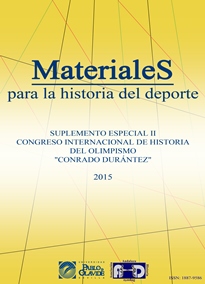The olympic philosophy in the olympic leitmotiv
Keywords:
Olympic Movement, philosophy, sport.Abstract
The official Olympic leitmotiv that "Citius, Fortius, Altius" devised by Didon in 1891 and accepted as official leitmotiv in 1894 refers to a moral progressive improvement not only in the simplicity of improving records. Perhaps the current Olympics are far away from Coubertin´s philosophy: the meeting of cultures, races, religions under one credo: Sport, which was the catalyst that helped humans to improve, as the slogan said, in all of vital fields. Actually, Olympic Games are the greatest sport event in the world (in terms of meeting athletes from different disciplines, spectators, television rights, etc.), and perhaps we could have the idea that the Olympic ideals are increasingly decadent. We can think that "Citius, Fortius, Altius" leitmotiv is outdated and obsolete. Nothing could be further from reality, the Olympic leitmotiv, one of the symbols of modern Olympism, is still very present. And especially since the 1988 Seoul Games, where the Olympic leitmotiv was regenerated and incorporated for the Organizing Committee. And since then, in each edition of the Games the leitmotiv is reinvented. Since then, each Organizing Committee has wanted to join a new slogan celebrating their "Games". In the present article, we make a brief analysis of the slogans or "leitmotivs" of the Games since the Seoul Games, 1988 to present.
Downloads
References
Durántez, Conrado, Pierre de Coubertin. Credo y simbología olímpica, Madrid: Comité Olímpico Español, 2013.
Durántez, Conrado, Olimpismo y deporte: valores y símbolos, Madrid: Comité Olímpico Español, 2006.
http://www.com.org.mx/seul-1988.html
http://ritmicainca.com/wp-content/uploads/2014/03/hodori1.jpg
http://www.espndeportes.com/news/story?id=247119
http://sportige.com/summer-olympic-games-mascots/
http://www.planetacurioso.com/2012/08/06/curiosidades-de-los-juegos-olimpicos-los-angeles-1984/
http://elpais.com/tag/juegos_olimpicos_1984/a/
http://www.todo-olimpiadas.com/Barcelona_1992_deportes+olimpicos.htm
http://www.bcn.cat/arxiu/visitadobrabcn92/es/content/about.html
http://www.barcelonaolimpica.net/tema.asp?id_bloc=1&id_tema=155&lng=esp
http://elpais.com/diario/1987/12/02/deportes/565398005_850215.html
http://www.espndeportes.com/news/story?id=250592
http://www.olympic.org/xxxxxxx-summer-olympics
http://www.granma.cu/granmad/eventos/beijing/datos/ant-jjoo/1996.htm
http://australia.gov.au/about-australia/australian-story/sydney-olympic-games-2000
http://corporate.olympics.com.au/games/2000-sydney
http://www.elmundo.es/jjoo/xxxx/
http://www.todo-olimpiadas.com/
http://www.marca.com/jjoo/xxxx/portada.html
http://www.ecured.cu/index.php/Juegos_Ol%C3%ADmpicos_de_xxxxxxxxx
Downloads
Published
Issue
Section
License
Authors who submit to this journal agree to the following terms:
- Author(s) keep copyright and guarantee to the journal the right to be the first publication of the work as licensed under Creative Commons Attribution-Noncommercial-ShareAlike 4.0 International as initial publication in this journal.
- Author(s) can establish additional agreements for non-exclusive distribution of the version of the work published in the journal (for example, to an institutional archives or to publish it in a book), with an acknowledgment of its initial publication in this journal.
- It is allowed and authors are encouraged to disseminate their work electronically (e.g, in institutional open archives or on their own website) before and during the submission process, as it can lead to productive exchanges, as well as a citation earlier and more of published work (See the Effect of Open Access).










